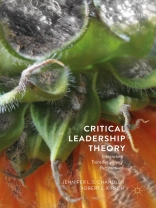This book contributes five novel tenets for building a critical theory of leadership studies. Drawing from transdisciplinary insights, these tenets help shape the emerging field of inquiry. They also facilitate the examination of normative social processes that reinscribe hegemonic power relations — because much of what is accomplished in current leadership scholarship, teaching, and practice reinforces these power relations. The book begins by contrasting critical theory with positivist approaches to analyzing social phenomena, and what follows is an exploration of four broad disciplines using sub-components of leadership as an investigatory lens. The resulting five tenets are presented and discussed so that they may be picked up and used by scholars contributing to the developing field of critical leadership studies.
Cuprins
Why is critical theory important?.- Interlude – Prepare for Exploring Movement and Direction through Transdisciplinary Vectors.- Exploring Movement and Direction in Aesthetics.- Exploring Movement and Direction in Social Sciences.- Exploring Movement and Direction in Animal Science.- Exploring Movement and Direction in Engineering.- Tenets of Critical Leadership Theory and their Implications.
Despre autor
Jennifer L. S. Chandler is a lecturer in the faculty of Leadership and Interdisciplinary Studies at Arizona State University, USA. Her research interests include leadership and diversity challenges within science, technology, engineering, and math (STEM) fields; organizational social norms; critical leadership; and critical Whiteness.
Robert E. Kirsch is a lecturer in the faculty of Leadership and Interdisciplinary Studies at Arizona State University, USA. He holds an interdisciplinary Ph.D. in Social, Political, Ethical, and Cultural Thought.












